Entrepreneurship Report: A Study of Walt Disney's Business Ventures
VerifiedAdded on 2023/01/05
|7
|2317
|28
Report
AI Summary
This report provides a comprehensive analysis of Walt Disney's entrepreneurial journey, examining his motivations and key characteristics that contributed to his success. The report begins by defining entrepreneurship and then delves into an evaluation of Disney's entrepreneurial motivations, including passion, inspiration, financial background, and commitment. It explores how these factors influenced his decisions and shaped his business ventures. The report also highlights several characteristics of entrepreneurship demonstrated by Walt Disney, such as his ability to build strong relationships, his willingness to take risks, his commitment to continuous improvement, his drive to achieve dreams, his perseverance, and his persuasive abilities. The report references relevant books and journals to support the analysis, providing a well-rounded understanding of Disney's impact on the business world. Finally, the report concludes by summarizing the key findings and emphasizing Disney's lasting legacy as a successful entrepreneur.
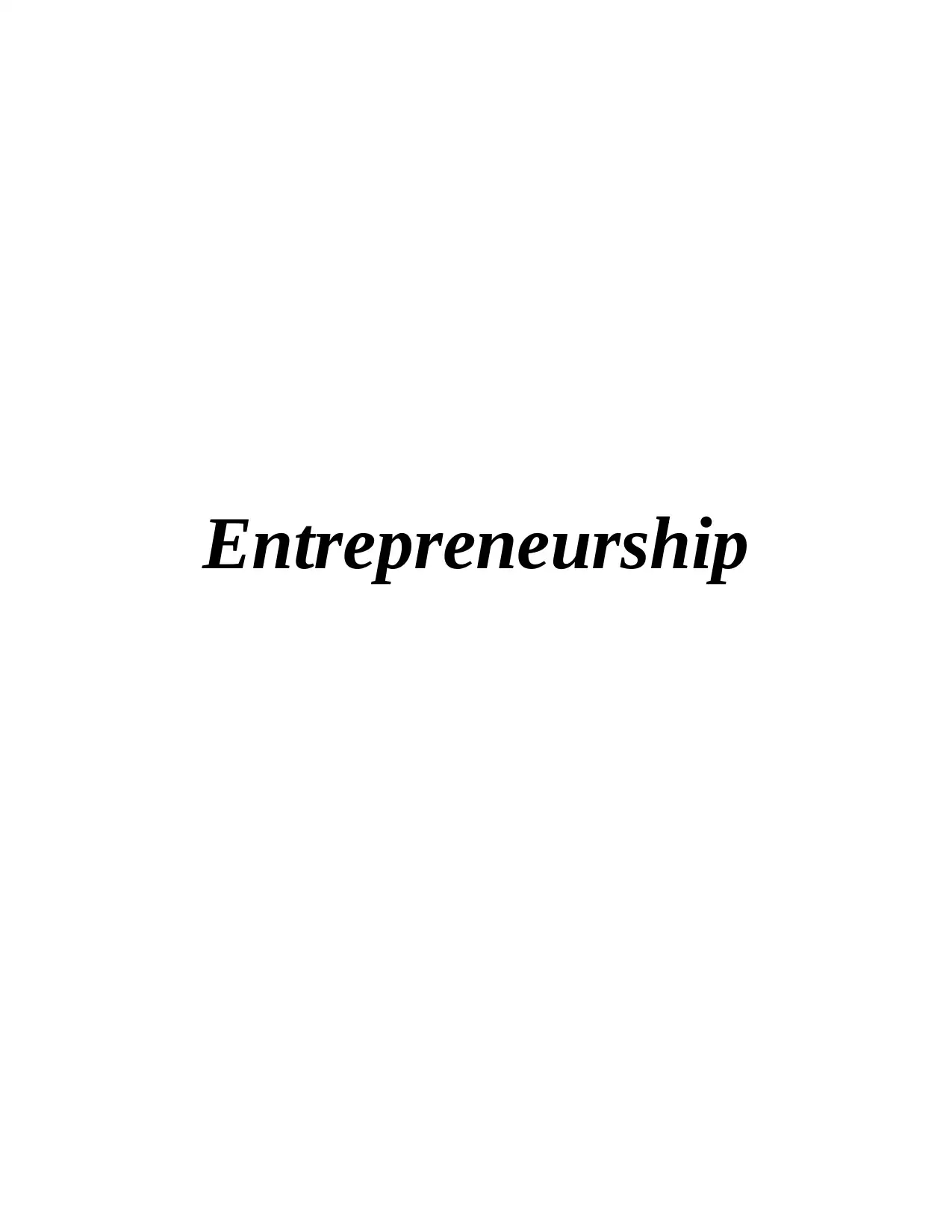
Entrepreneurship
Paraphrase This Document
Need a fresh take? Get an instant paraphrase of this document with our AI Paraphraser
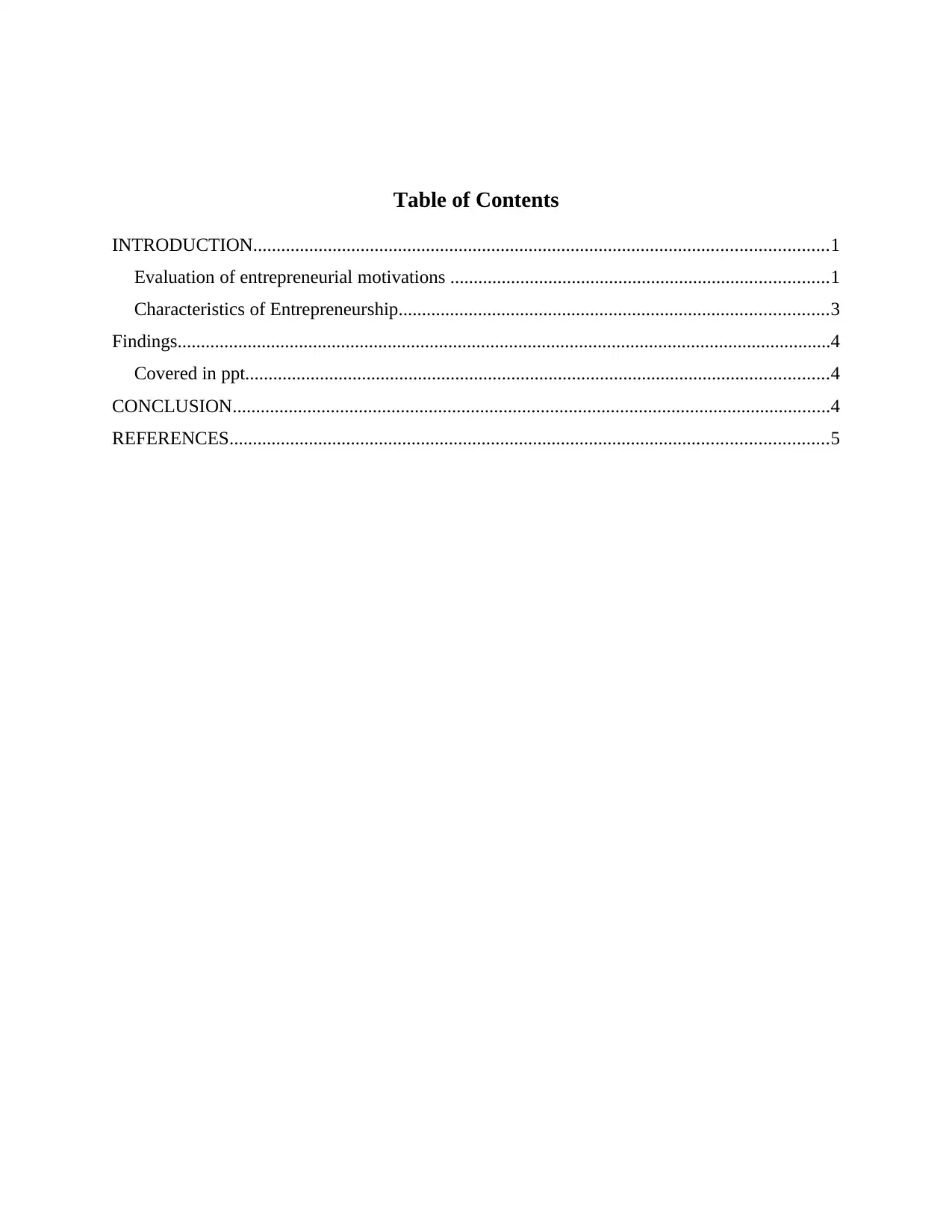
Table of Contents
INTRODUCTION...........................................................................................................................1
Evaluation of entrepreneurial motivations .................................................................................1
Characteristics of Entrepreneurship............................................................................................3
Findings............................................................................................................................................4
Covered in ppt.............................................................................................................................4
CONCLUSION................................................................................................................................4
REFERENCES................................................................................................................................5
INTRODUCTION...........................................................................................................................1
Evaluation of entrepreneurial motivations .................................................................................1
Characteristics of Entrepreneurship............................................................................................3
Findings............................................................................................................................................4
Covered in ppt.............................................................................................................................4
CONCLUSION................................................................................................................................4
REFERENCES................................................................................................................................5
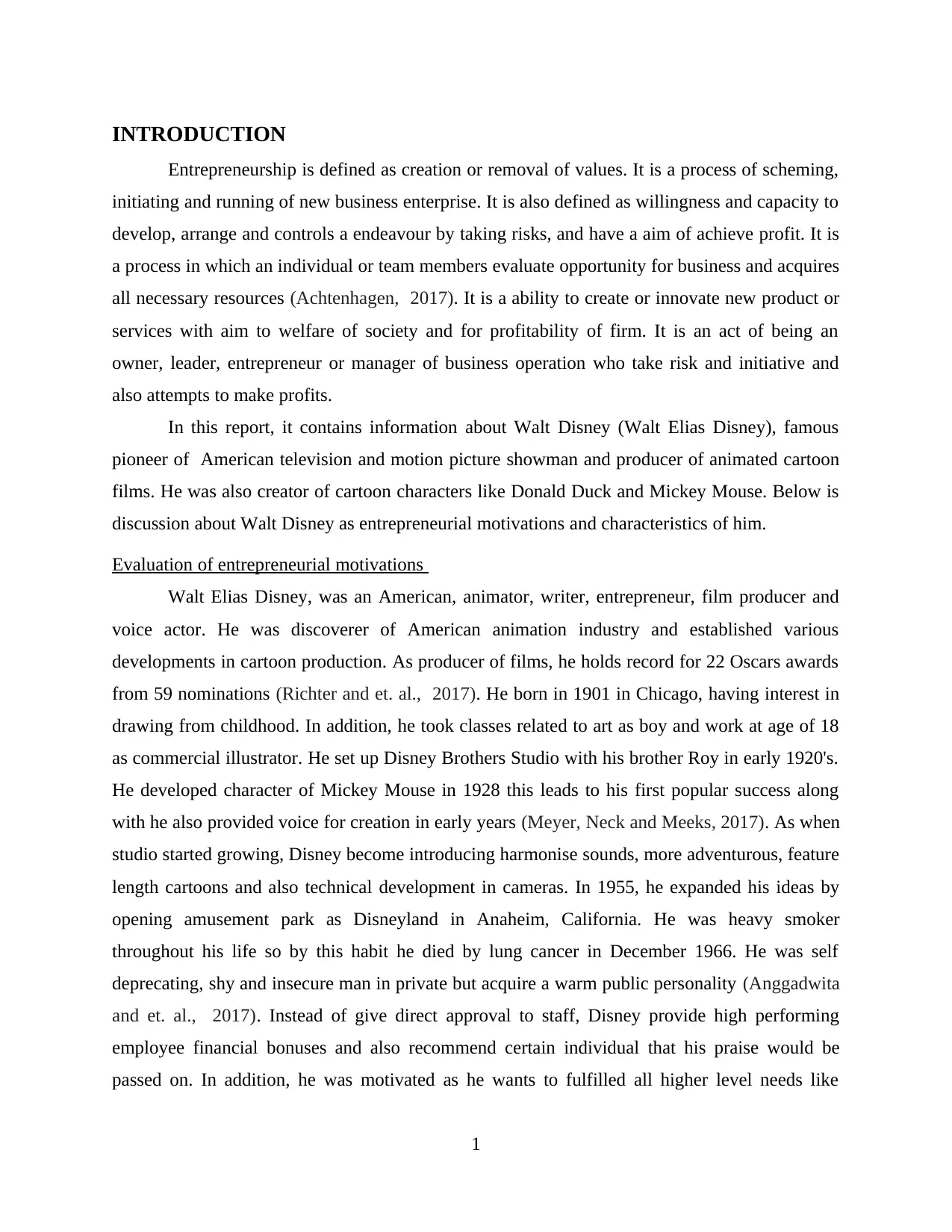
INTRODUCTION
Entrepreneurship is defined as creation or removal of values. It is a process of scheming,
initiating and running of new business enterprise. It is also defined as willingness and capacity to
develop, arrange and controls a endeavour by taking risks, and have a aim of achieve profit. It is
a process in which an individual or team members evaluate opportunity for business and acquires
all necessary resources (Achtenhagen, 2017). It is a ability to create or innovate new product or
services with aim to welfare of society and for profitability of firm. It is an act of being an
owner, leader, entrepreneur or manager of business operation who take risk and initiative and
also attempts to make profits.
In this report, it contains information about Walt Disney (Walt Elias Disney), famous
pioneer of American television and motion picture showman and producer of animated cartoon
films. He was also creator of cartoon characters like Donald Duck and Mickey Mouse. Below is
discussion about Walt Disney as entrepreneurial motivations and characteristics of him.
Evaluation of entrepreneurial motivations
Walt Elias Disney, was an American, animator, writer, entrepreneur, film producer and
voice actor. He was discoverer of American animation industry and established various
developments in cartoon production. As producer of films, he holds record for 22 Oscars awards
from 59 nominations (Richter and et. al., 2017). He born in 1901 in Chicago, having interest in
drawing from childhood. In addition, he took classes related to art as boy and work at age of 18
as commercial illustrator. He set up Disney Brothers Studio with his brother Roy in early 1920's.
He developed character of Mickey Mouse in 1928 this leads to his first popular success along
with he also provided voice for creation in early years (Meyer, Neck and Meeks, 2017). As when
studio started growing, Disney become introducing harmonise sounds, more adventurous, feature
length cartoons and also technical development in cameras. In 1955, he expanded his ideas by
opening amusement park as Disneyland in Anaheim, California. He was heavy smoker
throughout his life so by this habit he died by lung cancer in December 1966. He was self
deprecating, shy and insecure man in private but acquire a warm public personality (Anggadwita
and et. al., 2017). Instead of give direct approval to staff, Disney provide high performing
employee financial bonuses and also recommend certain individual that his praise would be
passed on. In addition, he was motivated as he wants to fulfilled all higher level needs like
1
Entrepreneurship is defined as creation or removal of values. It is a process of scheming,
initiating and running of new business enterprise. It is also defined as willingness and capacity to
develop, arrange and controls a endeavour by taking risks, and have a aim of achieve profit. It is
a process in which an individual or team members evaluate opportunity for business and acquires
all necessary resources (Achtenhagen, 2017). It is a ability to create or innovate new product or
services with aim to welfare of society and for profitability of firm. It is an act of being an
owner, leader, entrepreneur or manager of business operation who take risk and initiative and
also attempts to make profits.
In this report, it contains information about Walt Disney (Walt Elias Disney), famous
pioneer of American television and motion picture showman and producer of animated cartoon
films. He was also creator of cartoon characters like Donald Duck and Mickey Mouse. Below is
discussion about Walt Disney as entrepreneurial motivations and characteristics of him.
Evaluation of entrepreneurial motivations
Walt Elias Disney, was an American, animator, writer, entrepreneur, film producer and
voice actor. He was discoverer of American animation industry and established various
developments in cartoon production. As producer of films, he holds record for 22 Oscars awards
from 59 nominations (Richter and et. al., 2017). He born in 1901 in Chicago, having interest in
drawing from childhood. In addition, he took classes related to art as boy and work at age of 18
as commercial illustrator. He set up Disney Brothers Studio with his brother Roy in early 1920's.
He developed character of Mickey Mouse in 1928 this leads to his first popular success along
with he also provided voice for creation in early years (Meyer, Neck and Meeks, 2017). As when
studio started growing, Disney become introducing harmonise sounds, more adventurous, feature
length cartoons and also technical development in cameras. In 1955, he expanded his ideas by
opening amusement park as Disneyland in Anaheim, California. He was heavy smoker
throughout his life so by this habit he died by lung cancer in December 1966. He was self
deprecating, shy and insecure man in private but acquire a warm public personality (Anggadwita
and et. al., 2017). Instead of give direct approval to staff, Disney provide high performing
employee financial bonuses and also recommend certain individual that his praise would be
passed on. In addition, he was motivated as he wants to fulfilled all higher level needs like
1
⊘ This is a preview!⊘
Do you want full access?
Subscribe today to unlock all pages.

Trusted by 1+ million students worldwide
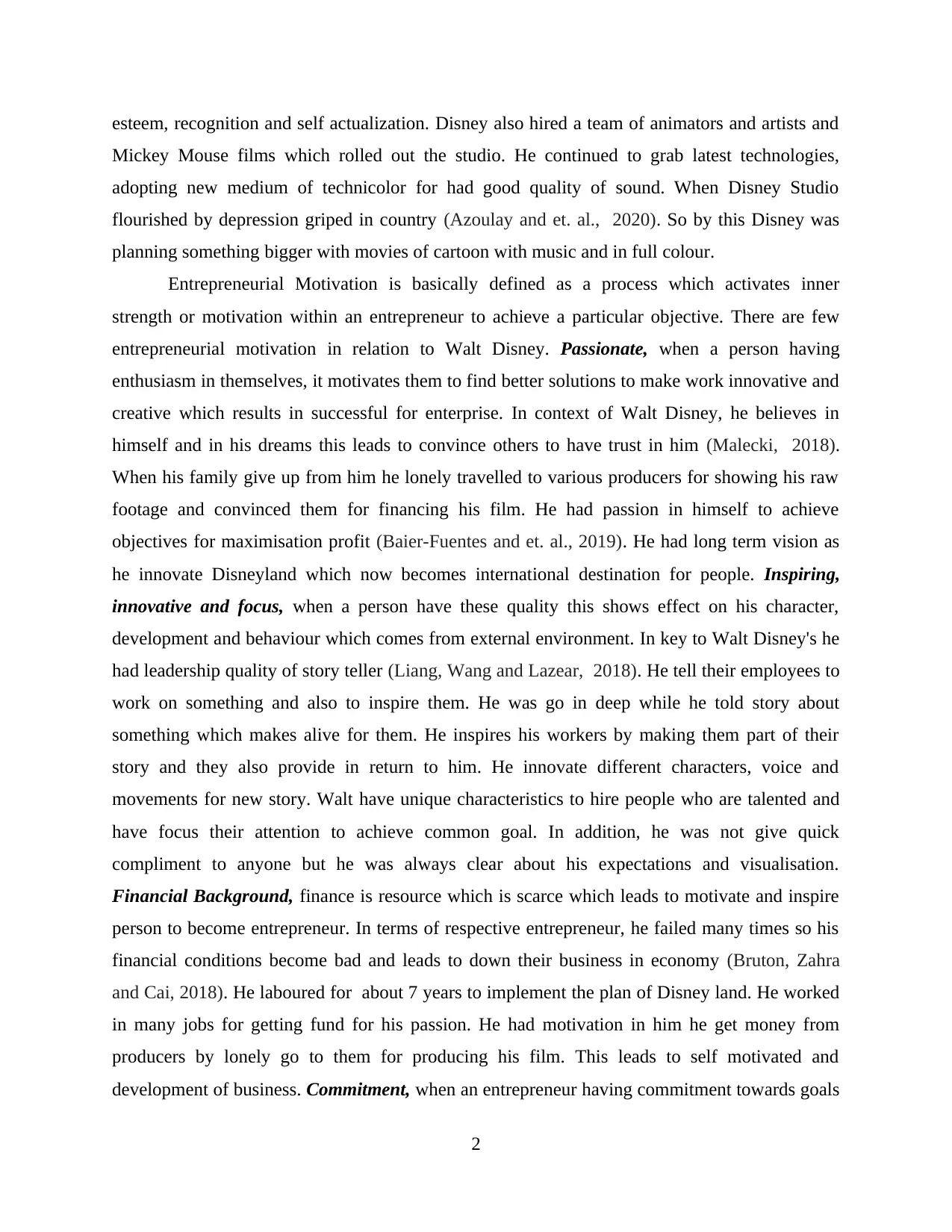
esteem, recognition and self actualization. Disney also hired a team of animators and artists and
Mickey Mouse films which rolled out the studio. He continued to grab latest technologies,
adopting new medium of technicolor for had good quality of sound. When Disney Studio
flourished by depression griped in country (Azoulay and et. al., 2020). So by this Disney was
planning something bigger with movies of cartoon with music and in full colour.
Entrepreneurial Motivation is basically defined as a process which activates inner
strength or motivation within an entrepreneur to achieve a particular objective. There are few
entrepreneurial motivation in relation to Walt Disney. Passionate, when a person having
enthusiasm in themselves, it motivates them to find better solutions to make work innovative and
creative which results in successful for enterprise. In context of Walt Disney, he believes in
himself and in his dreams this leads to convince others to have trust in him (Malecki, 2018).
When his family give up from him he lonely travelled to various producers for showing his raw
footage and convinced them for financing his film. He had passion in himself to achieve
objectives for maximisation profit (Baier-Fuentes and et. al., 2019). He had long term vision as
he innovate Disneyland which now becomes international destination for people. Inspiring,
innovative and focus, when a person have these quality this shows effect on his character,
development and behaviour which comes from external environment. In key to Walt Disney's he
had leadership quality of story teller (Liang, Wang and Lazear, 2018). He tell their employees to
work on something and also to inspire them. He was go in deep while he told story about
something which makes alive for them. He inspires his workers by making them part of their
story and they also provide in return to him. He innovate different characters, voice and
movements for new story. Walt have unique characteristics to hire people who are talented and
have focus their attention to achieve common goal. In addition, he was not give quick
compliment to anyone but he was always clear about his expectations and visualisation.
Financial Background, finance is resource which is scarce which leads to motivate and inspire
person to become entrepreneur. In terms of respective entrepreneur, he failed many times so his
financial conditions become bad and leads to down their business in economy (Bruton, Zahra
and Cai, 2018). He laboured for about 7 years to implement the plan of Disney land. He worked
in many jobs for getting fund for his passion. He had motivation in him he get money from
producers by lonely go to them for producing his film. This leads to self motivated and
development of business. Commitment, when an entrepreneur having commitment towards goals
2
Mickey Mouse films which rolled out the studio. He continued to grab latest technologies,
adopting new medium of technicolor for had good quality of sound. When Disney Studio
flourished by depression griped in country (Azoulay and et. al., 2020). So by this Disney was
planning something bigger with movies of cartoon with music and in full colour.
Entrepreneurial Motivation is basically defined as a process which activates inner
strength or motivation within an entrepreneur to achieve a particular objective. There are few
entrepreneurial motivation in relation to Walt Disney. Passionate, when a person having
enthusiasm in themselves, it motivates them to find better solutions to make work innovative and
creative which results in successful for enterprise. In context of Walt Disney, he believes in
himself and in his dreams this leads to convince others to have trust in him (Malecki, 2018).
When his family give up from him he lonely travelled to various producers for showing his raw
footage and convinced them for financing his film. He had passion in himself to achieve
objectives for maximisation profit (Baier-Fuentes and et. al., 2019). He had long term vision as
he innovate Disneyland which now becomes international destination for people. Inspiring,
innovative and focus, when a person have these quality this shows effect on his character,
development and behaviour which comes from external environment. In key to Walt Disney's he
had leadership quality of story teller (Liang, Wang and Lazear, 2018). He tell their employees to
work on something and also to inspire them. He was go in deep while he told story about
something which makes alive for them. He inspires his workers by making them part of their
story and they also provide in return to him. He innovate different characters, voice and
movements for new story. Walt have unique characteristics to hire people who are talented and
have focus their attention to achieve common goal. In addition, he was not give quick
compliment to anyone but he was always clear about his expectations and visualisation.
Financial Background, finance is resource which is scarce which leads to motivate and inspire
person to become entrepreneur. In terms of respective entrepreneur, he failed many times so his
financial conditions become bad and leads to down their business in economy (Bruton, Zahra
and Cai, 2018). He laboured for about 7 years to implement the plan of Disney land. He worked
in many jobs for getting fund for his passion. He had motivation in him he get money from
producers by lonely go to them for producing his film. This leads to self motivated and
development of business. Commitment, when an entrepreneur having commitment towards goals
2
Paraphrase This Document
Need a fresh take? Get an instant paraphrase of this document with our AI Paraphraser
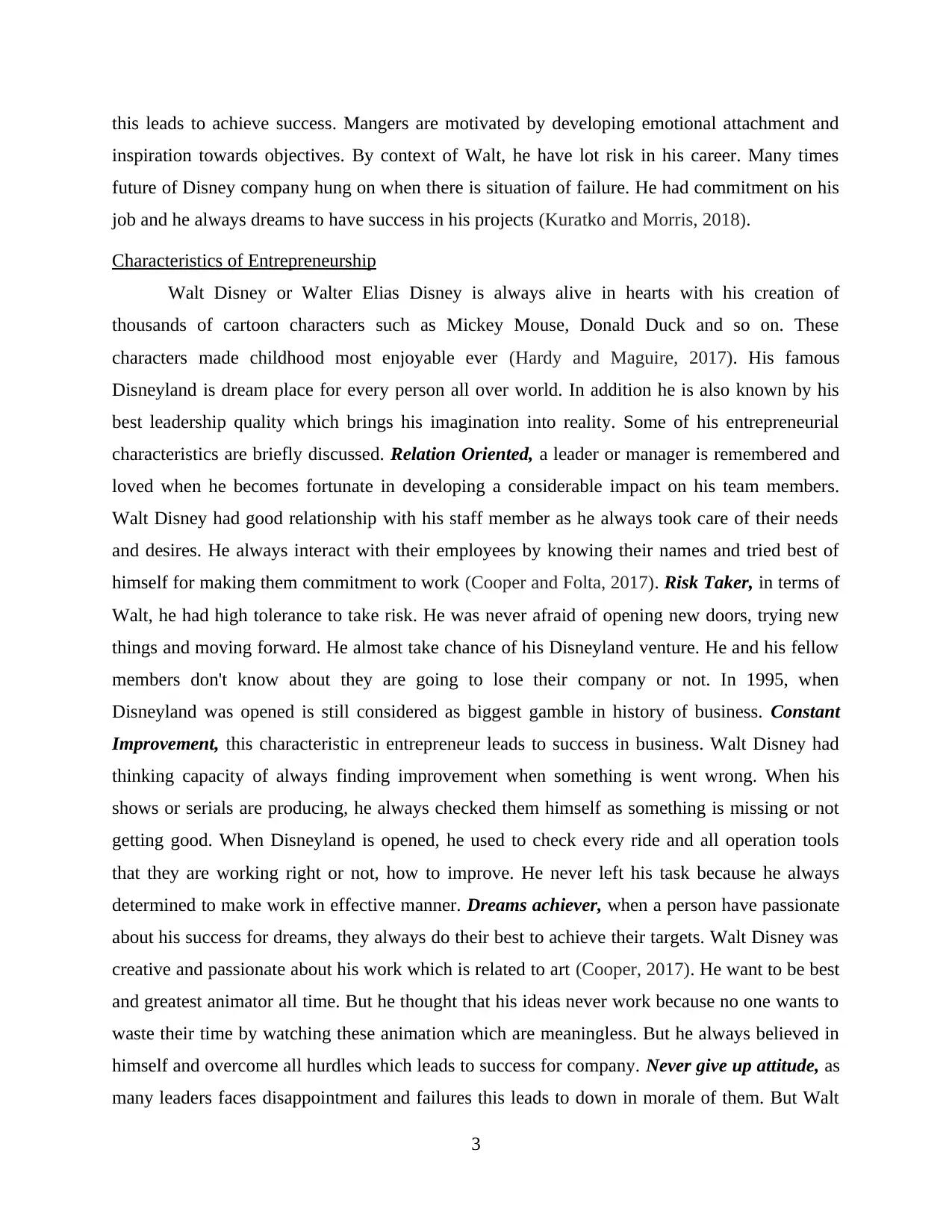
this leads to achieve success. Mangers are motivated by developing emotional attachment and
inspiration towards objectives. By context of Walt, he have lot risk in his career. Many times
future of Disney company hung on when there is situation of failure. He had commitment on his
job and he always dreams to have success in his projects (Kuratko and Morris, 2018).
Characteristics of Entrepreneurship
Walt Disney or Walter Elias Disney is always alive in hearts with his creation of
thousands of cartoon characters such as Mickey Mouse, Donald Duck and so on. These
characters made childhood most enjoyable ever (Hardy and Maguire, 2017). His famous
Disneyland is dream place for every person all over world. In addition he is also known by his
best leadership quality which brings his imagination into reality. Some of his entrepreneurial
characteristics are briefly discussed. Relation Oriented, a leader or manager is remembered and
loved when he becomes fortunate in developing a considerable impact on his team members.
Walt Disney had good relationship with his staff member as he always took care of their needs
and desires. He always interact with their employees by knowing their names and tried best of
himself for making them commitment to work (Cooper and Folta, 2017). Risk Taker, in terms of
Walt, he had high tolerance to take risk. He was never afraid of opening new doors, trying new
things and moving forward. He almost take chance of his Disneyland venture. He and his fellow
members don't know about they are going to lose their company or not. In 1995, when
Disneyland was opened is still considered as biggest gamble in history of business. Constant
Improvement, this characteristic in entrepreneur leads to success in business. Walt Disney had
thinking capacity of always finding improvement when something is went wrong. When his
shows or serials are producing, he always checked them himself as something is missing or not
getting good. When Disneyland is opened, he used to check every ride and all operation tools
that they are working right or not, how to improve. He never left his task because he always
determined to make work in effective manner. Dreams achiever, when a person have passionate
about his success for dreams, they always do their best to achieve their targets. Walt Disney was
creative and passionate about his work which is related to art (Cooper, 2017). He want to be best
and greatest animator all time. But he thought that his ideas never work because no one wants to
waste their time by watching these animation which are meaningless. But he always believed in
himself and overcome all hurdles which leads to success for company. Never give up attitude, as
many leaders faces disappointment and failures this leads to down in morale of them. But Walt
3
inspiration towards objectives. By context of Walt, he have lot risk in his career. Many times
future of Disney company hung on when there is situation of failure. He had commitment on his
job and he always dreams to have success in his projects (Kuratko and Morris, 2018).
Characteristics of Entrepreneurship
Walt Disney or Walter Elias Disney is always alive in hearts with his creation of
thousands of cartoon characters such as Mickey Mouse, Donald Duck and so on. These
characters made childhood most enjoyable ever (Hardy and Maguire, 2017). His famous
Disneyland is dream place for every person all over world. In addition he is also known by his
best leadership quality which brings his imagination into reality. Some of his entrepreneurial
characteristics are briefly discussed. Relation Oriented, a leader or manager is remembered and
loved when he becomes fortunate in developing a considerable impact on his team members.
Walt Disney had good relationship with his staff member as he always took care of their needs
and desires. He always interact with their employees by knowing their names and tried best of
himself for making them commitment to work (Cooper and Folta, 2017). Risk Taker, in terms of
Walt, he had high tolerance to take risk. He was never afraid of opening new doors, trying new
things and moving forward. He almost take chance of his Disneyland venture. He and his fellow
members don't know about they are going to lose their company or not. In 1995, when
Disneyland was opened is still considered as biggest gamble in history of business. Constant
Improvement, this characteristic in entrepreneur leads to success in business. Walt Disney had
thinking capacity of always finding improvement when something is went wrong. When his
shows or serials are producing, he always checked them himself as something is missing or not
getting good. When Disneyland is opened, he used to check every ride and all operation tools
that they are working right or not, how to improve. He never left his task because he always
determined to make work in effective manner. Dreams achiever, when a person have passionate
about his success for dreams, they always do their best to achieve their targets. Walt Disney was
creative and passionate about his work which is related to art (Cooper, 2017). He want to be best
and greatest animator all time. But he thought that his ideas never work because no one wants to
waste their time by watching these animation which are meaningless. But he always believed in
himself and overcome all hurdles which leads to success for company. Never give up attitude, as
many leaders faces disappointment and failures this leads to down in morale of them. But Walt
3
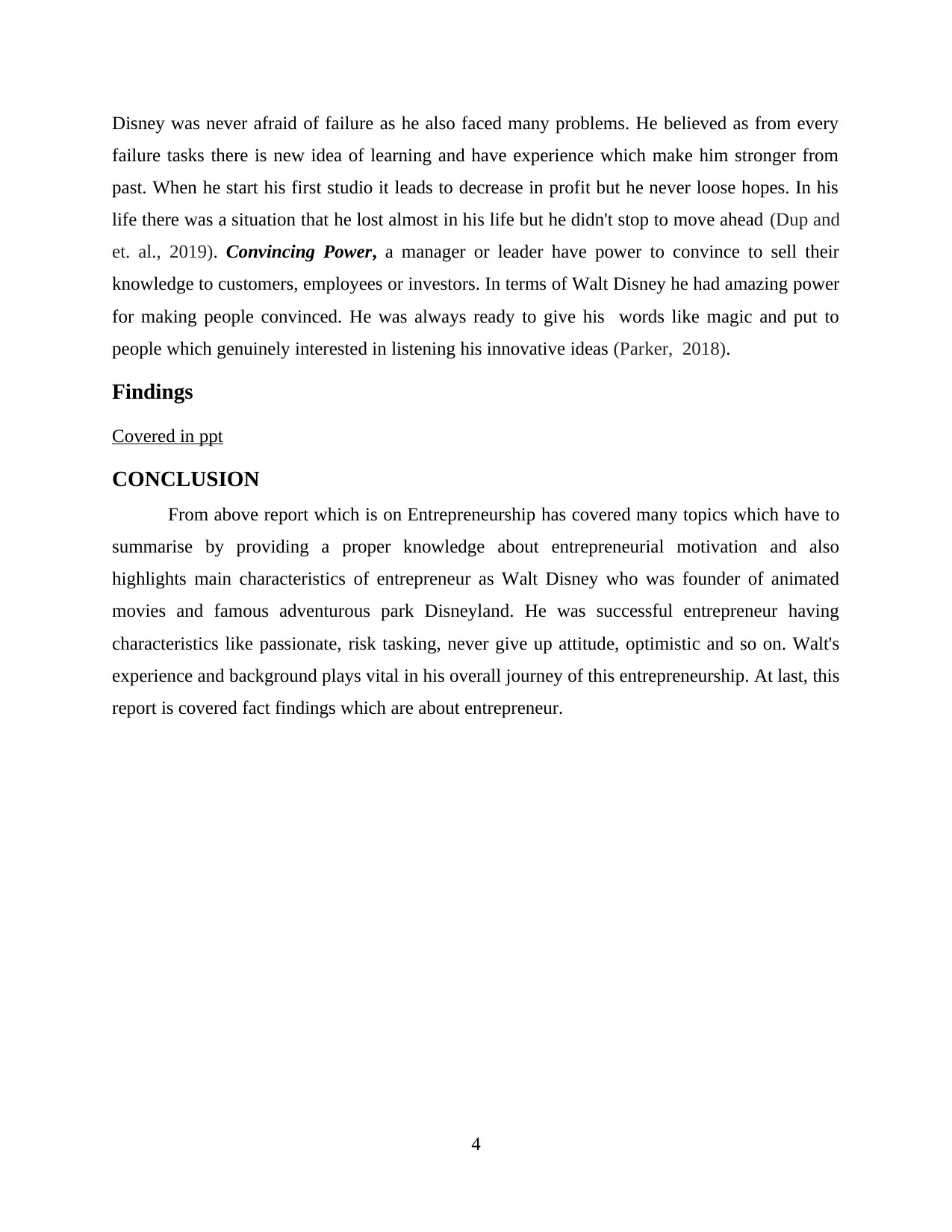
Disney was never afraid of failure as he also faced many problems. He believed as from every
failure tasks there is new idea of learning and have experience which make him stronger from
past. When he start his first studio it leads to decrease in profit but he never loose hopes. In his
life there was a situation that he lost almost in his life but he didn't stop to move ahead (Dup and
et. al., 2019). Convincing Power, a manager or leader have power to convince to sell their
knowledge to customers, employees or investors. In terms of Walt Disney he had amazing power
for making people convinced. He was always ready to give his words like magic and put to
people which genuinely interested in listening his innovative ideas (Parker, 2018).
Findings
Covered in ppt
CONCLUSION
From above report which is on Entrepreneurship has covered many topics which have to
summarise by providing a proper knowledge about entrepreneurial motivation and also
highlights main characteristics of entrepreneur as Walt Disney who was founder of animated
movies and famous adventurous park Disneyland. He was successful entrepreneur having
characteristics like passionate, risk tasking, never give up attitude, optimistic and so on. Walt's
experience and background plays vital in his overall journey of this entrepreneurship. At last, this
report is covered fact findings which are about entrepreneur.
4
failure tasks there is new idea of learning and have experience which make him stronger from
past. When he start his first studio it leads to decrease in profit but he never loose hopes. In his
life there was a situation that he lost almost in his life but he didn't stop to move ahead (Dup and
et. al., 2019). Convincing Power, a manager or leader have power to convince to sell their
knowledge to customers, employees or investors. In terms of Walt Disney he had amazing power
for making people convinced. He was always ready to give his words like magic and put to
people which genuinely interested in listening his innovative ideas (Parker, 2018).
Findings
Covered in ppt
CONCLUSION
From above report which is on Entrepreneurship has covered many topics which have to
summarise by providing a proper knowledge about entrepreneurial motivation and also
highlights main characteristics of entrepreneur as Walt Disney who was founder of animated
movies and famous adventurous park Disneyland. He was successful entrepreneur having
characteristics like passionate, risk tasking, never give up attitude, optimistic and so on. Walt's
experience and background plays vital in his overall journey of this entrepreneurship. At last, this
report is covered fact findings which are about entrepreneur.
4
⊘ This is a preview!⊘
Do you want full access?
Subscribe today to unlock all pages.

Trusted by 1+ million students worldwide
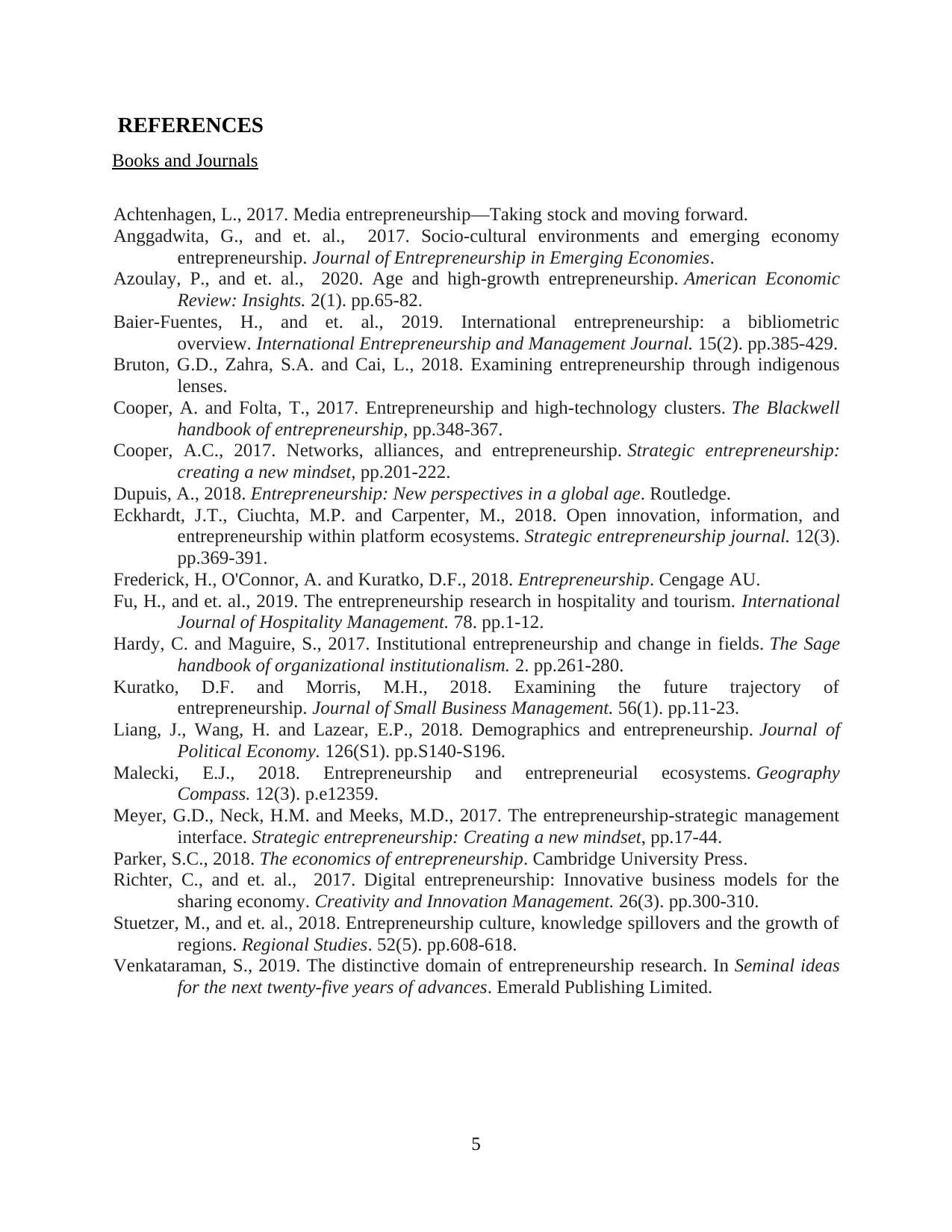
REFERENCES
Books and Journals
Achtenhagen, L., 2017. Media entrepreneurship—Taking stock and moving forward.
Anggadwita, G., and et. al., 2017. Socio-cultural environments and emerging economy
entrepreneurship. Journal of Entrepreneurship in Emerging Economies.
Azoulay, P., and et. al., 2020. Age and high-growth entrepreneurship. American Economic
Review: Insights. 2(1). pp.65-82.
Baier-Fuentes, H., and et. al., 2019. International entrepreneurship: a bibliometric
overview. International Entrepreneurship and Management Journal. 15(2). pp.385-429.
Bruton, G.D., Zahra, S.A. and Cai, L., 2018. Examining entrepreneurship through indigenous
lenses.
Cooper, A. and Folta, T., 2017. Entrepreneurship and high‐technology clusters. The Blackwell
handbook of entrepreneurship, pp.348-367.
Cooper, A.C., 2017. Networks, alliances, and entrepreneurship. Strategic entrepreneurship:
creating a new mindset, pp.201-222.
Dupuis, A., 2018. Entrepreneurship: New perspectives in a global age. Routledge.
Eckhardt, J.T., Ciuchta, M.P. and Carpenter, M., 2018. Open innovation, information, and
entrepreneurship within platform ecosystems. Strategic entrepreneurship journal. 12(3).
pp.369-391.
Frederick, H., O'Connor, A. and Kuratko, D.F., 2018. Entrepreneurship. Cengage AU.
Fu, H., and et. al., 2019. The entrepreneurship research in hospitality and tourism. International
Journal of Hospitality Management. 78. pp.1-12.
Hardy, C. and Maguire, S., 2017. Institutional entrepreneurship and change in fields. The Sage
handbook of organizational institutionalism. 2. pp.261-280.
Kuratko, D.F. and Morris, M.H., 2018. Examining the future trajectory of
entrepreneurship. Journal of Small Business Management. 56(1). pp.11-23.
Liang, J., Wang, H. and Lazear, E.P., 2018. Demographics and entrepreneurship. Journal of
Political Economy. 126(S1). pp.S140-S196.
Malecki, E.J., 2018. Entrepreneurship and entrepreneurial ecosystems. Geography
Compass. 12(3). p.e12359.
Meyer, G.D., Neck, H.M. and Meeks, M.D., 2017. The entrepreneurship‐strategic management
interface. Strategic entrepreneurship: Creating a new mindset, pp.17-44.
Parker, S.C., 2018. The economics of entrepreneurship. Cambridge University Press.
Richter, C., and et. al., 2017. Digital entrepreneurship: Innovative business models for the
sharing economy. Creativity and Innovation Management. 26(3). pp.300-310.
Stuetzer, M., and et. al., 2018. Entrepreneurship culture, knowledge spillovers and the growth of
regions. Regional Studies. 52(5). pp.608-618.
Venkataraman, S., 2019. The distinctive domain of entrepreneurship research. In Seminal ideas
for the next twenty-five years of advances. Emerald Publishing Limited.
5
Books and Journals
Achtenhagen, L., 2017. Media entrepreneurship—Taking stock and moving forward.
Anggadwita, G., and et. al., 2017. Socio-cultural environments and emerging economy
entrepreneurship. Journal of Entrepreneurship in Emerging Economies.
Azoulay, P., and et. al., 2020. Age and high-growth entrepreneurship. American Economic
Review: Insights. 2(1). pp.65-82.
Baier-Fuentes, H., and et. al., 2019. International entrepreneurship: a bibliometric
overview. International Entrepreneurship and Management Journal. 15(2). pp.385-429.
Bruton, G.D., Zahra, S.A. and Cai, L., 2018. Examining entrepreneurship through indigenous
lenses.
Cooper, A. and Folta, T., 2017. Entrepreneurship and high‐technology clusters. The Blackwell
handbook of entrepreneurship, pp.348-367.
Cooper, A.C., 2017. Networks, alliances, and entrepreneurship. Strategic entrepreneurship:
creating a new mindset, pp.201-222.
Dupuis, A., 2018. Entrepreneurship: New perspectives in a global age. Routledge.
Eckhardt, J.T., Ciuchta, M.P. and Carpenter, M., 2018. Open innovation, information, and
entrepreneurship within platform ecosystems. Strategic entrepreneurship journal. 12(3).
pp.369-391.
Frederick, H., O'Connor, A. and Kuratko, D.F., 2018. Entrepreneurship. Cengage AU.
Fu, H., and et. al., 2019. The entrepreneurship research in hospitality and tourism. International
Journal of Hospitality Management. 78. pp.1-12.
Hardy, C. and Maguire, S., 2017. Institutional entrepreneurship and change in fields. The Sage
handbook of organizational institutionalism. 2. pp.261-280.
Kuratko, D.F. and Morris, M.H., 2018. Examining the future trajectory of
entrepreneurship. Journal of Small Business Management. 56(1). pp.11-23.
Liang, J., Wang, H. and Lazear, E.P., 2018. Demographics and entrepreneurship. Journal of
Political Economy. 126(S1). pp.S140-S196.
Malecki, E.J., 2018. Entrepreneurship and entrepreneurial ecosystems. Geography
Compass. 12(3). p.e12359.
Meyer, G.D., Neck, H.M. and Meeks, M.D., 2017. The entrepreneurship‐strategic management
interface. Strategic entrepreneurship: Creating a new mindset, pp.17-44.
Parker, S.C., 2018. The economics of entrepreneurship. Cambridge University Press.
Richter, C., and et. al., 2017. Digital entrepreneurship: Innovative business models for the
sharing economy. Creativity and Innovation Management. 26(3). pp.300-310.
Stuetzer, M., and et. al., 2018. Entrepreneurship culture, knowledge spillovers and the growth of
regions. Regional Studies. 52(5). pp.608-618.
Venkataraman, S., 2019. The distinctive domain of entrepreneurship research. In Seminal ideas
for the next twenty-five years of advances. Emerald Publishing Limited.
5
1 out of 7
Related Documents
Your All-in-One AI-Powered Toolkit for Academic Success.
+13062052269
info@desklib.com
Available 24*7 on WhatsApp / Email
![[object Object]](/_next/static/media/star-bottom.7253800d.svg)
Unlock your academic potential
Copyright © 2020–2026 A2Z Services. All Rights Reserved. Developed and managed by ZUCOL.





